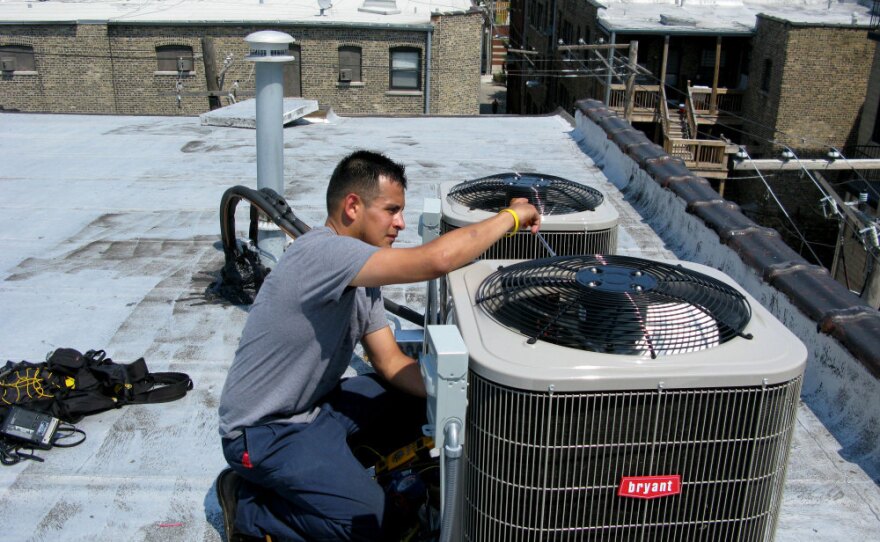It will be intensely hot again Thursday in many parts of the country. From the South and the Midwest to the East Coast, temperatures will soar again into the 90s and could top 100.
Heat advisories were issued in at least 27 states. Officials say at least 22 people have died from heat-related illnesses. For many, it will likely remain hot and humid for several more days to come.
Eric Rebolledo was on top of the sun-baked roof of an old greystone 3-flat on Chicago's North Side, sweltering as he kneeled alongside a sputtering air-conditioning unit that was not cranking out the cool air that it should.
'Try To Hydrate'
The repairman for AllTemp Heating and Air Conditioning has been doing this a lot lately.
"Long hours, hot days, man," he said. "Up in the roof, it's usually pretty hot, man, but try to hydrate, you know, make sure you drink enough water. Got a cooler in the truck."
The high temperature in Chicago on Wednesday was 99; the high humidity made it feel like 110. Rebolledo said the heat was crippling many air conditioners.
"We're getting a lot of breakdowns just due to the hot weather," he said. "Instead of running only 6 hours a day, they're running 12, 13, 15 hours a day. These air conditioners are definitely taking a beating these last couple of days."
Rebolleda was working 12-hour shifts and his company has repair crews available 24 hours a day, seven days a week. He said understood his job had an extra level of urgency to it right now.
"We got to provide the service, when it's needed," he said. "I got a lot of elderly customers and this weather can definitely be deadly."
Heat-Related Deaths
The heat turned deadly in some parts of the Midwest: In Kansas City, where the heat wave is entering its 10th day, Mayor Sly James said heat appears to be a factor in the deaths of at least 13 people.
"Generally, the folks who have died have been those who have been less able to protect themselves against the heat for lack of air conditioning, fans, cool places, those types of things," James said. "And those folks who are often elderly, or concentrated in high rises, or in places where there are pockets of poverty."
In Kansas City, Chicago and other cities, officials made door-to-door well-being checks on older residents and those with health problems. People were being asked to check on their neighbors, and cooling centers were open for people without air conditioning.
Kim Kristensen, an in-home-care nurse in Madison, Wis., has been checking in with the elderly.
"The one client that we are really worried about are the elderly population who unfortunately don't have any assistance. ... They're very much at risk in this hot weather," she told NPR's Michele Norris.
Still, hospitals around the Midwest reported seeing scores of patients with heat-related illnesses, including heat stroke and dehydration.
Melissa Eland was carrying three water bottles, trying to stay cool, as she walked to class at Indiana University.
"It's killer," she said. "But I got plenty of water so it's not that bad."
The heat was also putting a huge demand on the nation's power grid, leading to scattered power outages.
"It's going to mean elevated power demand for an extended period of time for a lot of people," said Travis Hartman, the Energy Weather Manager at MDA Earthstat, which proves forecasts for utilities and other weather-dependent businesses.
Nationwide, Thursday and Friday will be hotter than any time since 1950, he said.
Crops Affected
Hot pavement was buckling on some highways. The hot weather was also baking some crops.
"What happens when plants get heat stressed and water stressed is they get curly leaves like this," said Curtis Millsap, who owns and operates an organic farm outside of Springfield, Mo. He said this summer's heat is much earlier and much more intense than usual, leading to wilting lettuce and fewer vegetables.
Pointing to some blossoms, he said, "They should stay on there and become cherry tomatoes, and they're just falling off. It's too hot for them."
For many farmers, the heat adds insult to injury. Flooding and a cold wet spring led many to plant late. Now their corn, wheat and other crop yields might even be smaller.
Dairy production is down, too, as hot cows don't give as much milk.
It's so hot in some areas, livestock are dropping dead: At least 1,500 cattle in South Dakota died because of the heat, as did some dairy cows in Wisconsin and Minnesota, and thousands of chickens and turkeys on poultry farms from Kansas to North Carolina.
Temperatures are expected to cool a bit Thursday in some parts of the Midwest, if you can call the upper 80s cool, but they will only rise in the East as the heat dome covering much of the country slowly moves that way.
Meteorologist Allan Dunham with the National Weather Service in Taunton, Mass., said the high dew point level, combined with hot temperatures, will drench the North Atlantic states in Florida-like conditions.
"This is going to cover basically all of southern New England, getting up into southern New Hampshire all the way back towards New York and down along the Mid-Atlantic Seaboard," he said.
NPR's David Schaper and Joel Rose, Sara Wittmeyer of member station WFIU and Bradley Campbell of member station WRNI contributed to this report, which includes material from The Associated Press
Copyright 2022 NPR. To see more, visit https://www.npr.org. 9(MDAzMjM2NDYzMDEyMzc1Njk5NjAxNzY3OQ001))






